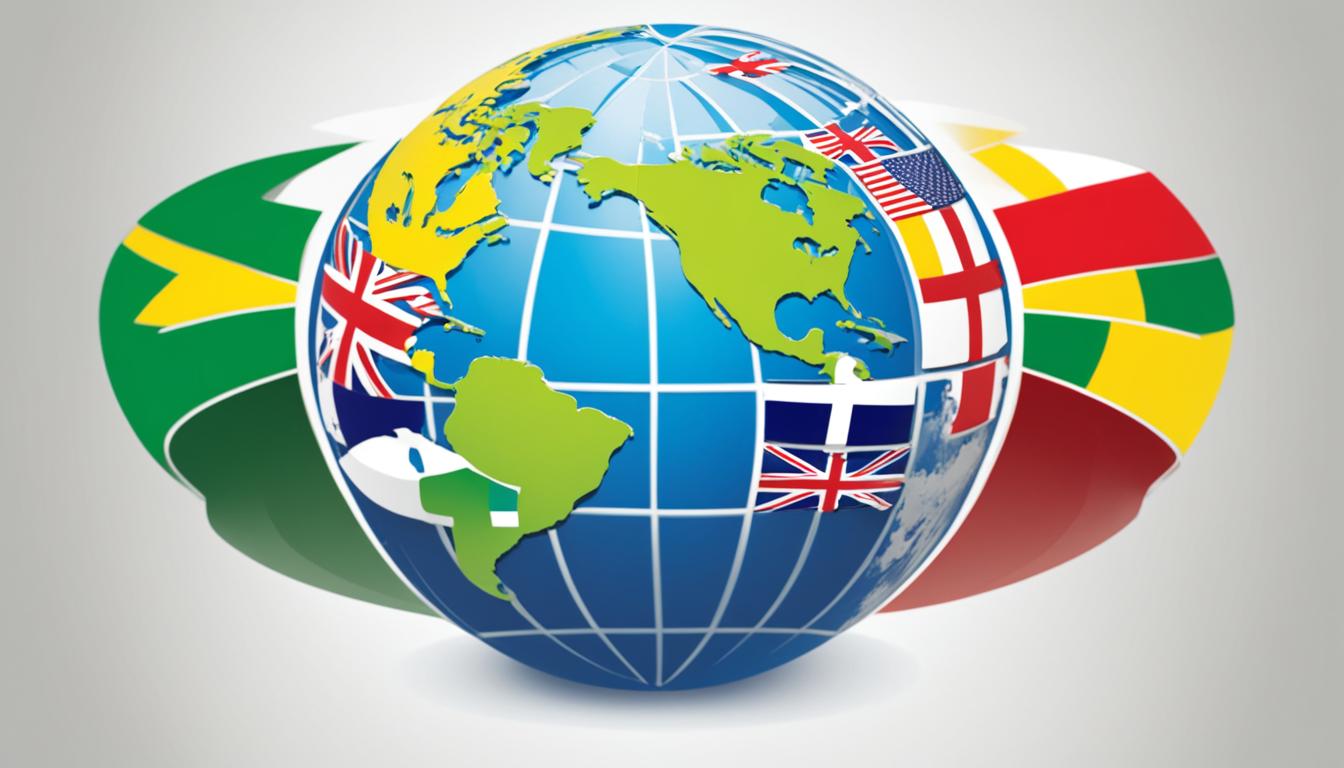Royal Caribbean International, one of the world’s leading cruise lines, has developed a robust and innovative marketing strategy to solidify its position in the highly competitive cruise industry. By combining cruise line promotions, digital marketing tactics, customer engagement strategies, branding initiatives, competitive analysis, social media campaigns, and market expansion plans, Royal Caribbean has successfully captured the attention of its target audience and differentiated itself in the market.
With a focus on captivating millennial families, Royal Caribbean has consistently evolved its marketing strategy to meet the evolving needs and preferences of its target demographic. The company launched the “Come Seek” campaign in 2015, offering unique vacation experiences tailored to millennial families. Even during the pandemic, Royal Caribbean adapted by engaging with customers virtually through virtual cruising experiences. This customer-centric approach has allowed the company to build strong connections and maintain a loyal customer base.
Key Takeaways:
- Royal Caribbean International has developed a comprehensive and innovative marketing strategy to target millennial families.
- The “Come Seek” campaign successfully resonated with the target audience, offering unique vacation experiences.
- The company adapted its marketing approach during the pandemic by engaging with customers virtually.
- Royal Caribbean prioritizes customer engagement and utilizes various digital marketing tactics to connect with its target audience.
- The company has continuously evolved its marketing strategy to meet the changing needs of its customers and the industry.
Evolution of Royal Caribbean’s Marketing Strategy
Royal Caribbean has continuously evolved its marketing strategy to cater specifically to millennial families. Recognizing the importance of targeting this demographic, the company launched the “Come Seek” campaign in 2015. This innovative campaign focused on offering unique vacation experiences that resonated with millennial families seeking adventure, exploration, and memorable moments at sea.
Amidst the challenges presented by the pandemic, Royal Caribbean showcased its adaptability and commitment to customer engagement by transitioning to virtual cruising experiences. Through these digital initiatives, the company successfully engaged with customers from the comfort of their homes, offering a glimpse into the exciting world of cruising and building anticipation for future trips.
One of the key pillars of Royal Caribbean’s marketing strategy is its emphasis on social media campaigns. Leveraging popular platforms such as Facebook, Instagram, Twitter, and TikTok, the company effectively reaches and connects with its target audience. By utilizing engaging content and interactive features, Royal Caribbean maximizes customer engagement and creates a sense of community among its followers.
Additionally, Royal Caribbean invests in comprehensive competitive analysis to stay at the forefront of the cruise industry. This analysis enables the company to identify emerging trends, innovative digital marketing tactics, and customer engagement strategies employed by competitors. By staying informed and responsive to market changes, Royal Caribbean maintains its competitive edge and positions itself as a leader in the industry.
Market Expansion Plans
Looking ahead, Royal Caribbean has ambitious market expansion plans to further solidify its position as the go-to cruise line for millennial families. The company aims to explore untapped markets and introduce new itineraries and destination offerings that align with the preferences and desires of its target audience.
By continuously adapting and refining its marketing strategies, Royal Caribbean remains a prominent player in the cruise industry. Its focus on cruise line promotions, digital marketing tactics, customer engagement strategies, branding initiatives, competitive analysis, social media campaigns, and market expansion plans has allowed the company to successfully cater to millennial families and maintain its leadership position in the ever-evolving cruise market.
| Marketing Tactics | Key Benefits |
|---|---|
| Cruise Line Promotions | Attract new customers and incentivize bookings |
| Digital Marketing Tactics | Reach and engage with the millennial demographic |
| Customer Engagement Strategies | Foster loyalty and create personalized experiences |
| Branding Initiatives | Create a strong and recognizable brand identity |
| Competitive Analysis | Stay ahead of industry trends and innovations |
| Social Media Campaigns | Connect with and inspire the target audience |
| Market Expansion Plans | Tap into new markets and attract new customers |
Digital and Social Media Focus
Royal Caribbean International understands the significance of digital marketing approach and social media channels in its overall marketing strategy. By leveraging these platforms, the company effectively engages with its target audience and showcases the exceptional guest experience offered on their cruise ships.
One key aspect of Royal Caribbean’s marketing strategy is its emphasis on influencer partnerships to promote the brand. Collaborating with influencers allows the company to reach a wider audience and showcase real-life experiences, creating an authentic connection with potential customers. These partnerships are carefully selected to align with Royal Caribbean’s brand values and resonate with their target demographic.
In addition to influencer partnerships, Royal Caribbean maintains a strong presence on various social media channels, including Facebook, Instagram, Twitter, and TikTok. These platforms serve as effective channels for sharing engaging content, interacting with customers, and driving interest and excitement around Royal Caribbean’s cruise offerings.
Moreover, Royal Caribbean allocates a significant portion of its marketing budget to live sports partnerships. By collaborating with popular sports events and teams, the company not only reaches families but also increases brand exposure to a diverse and captive audience.
To illustrate Royal Caribbean’s strong presence on social media platforms, here is a breakdown of the company’s follower count across major channels:
- Facebook: 2.5 million followers
- Instagram: 1.8 million followers
- Twitter: 900k followers
- TikTok: 600k followers
Royal Caribbean’s digital and social media focus ensures that the brand remains at the forefront of the cruise industry’s marketing efforts. Through influencer partnerships, a robust social media presence, and strategic live sports partnerships, Royal Caribbean effectively connects with its target audience and establishes itself as a leader in the industry.
| Social Media Channel | Follower Count |
|---|---|
| 2.5 million | |
| 1.8 million | |
| 900k | |
| TikTok | 600k |
Influencer Partnerships
Royal Caribbean’s marketing strategy leverages the power of influencer partnerships to effectively reach its target audience and amplify its brand messaging. By collaborating with influencers who align with the company’s core values and cater to niche markets, Royal Caribbean creates authentic and engaging content that resonates with specific target audiences.
These influencer partnerships play a crucial role in showcasing the guest experience aboard Royal Caribbean cruise ships. Influencers share their personal stories, highlighting the amenities, destinations, and unique experiences offered by the brand. Through storytelling and firsthand accounts, they create a powerful word-of-mouth marketing effect and generate a sense of excitement and curiosity among their followers.
One of the key advantages of influencer partnerships is the ability to tap into niche markets. By collaborating with influencers who have a dedicated following within a specific niche, Royal Caribbean can effectively target and engage with these audiences, promoting tailored cruise experiences that align with their interests and preferences.
These collaborations also allow Royal Caribbean to tap into the influential power of social media. Influencer partnerships enable the brand to connect with potential customers on platforms where they are already active and engaged. By leveraging the reach and influence of influencers, Royal Caribbean can significantly expand its brand visibility and connect with new audiences.
Furthermore, influencer partnerships are an effective means of creating authentic and relatable content. Influencers have established trust and credibility with their followers, and their endorsement of Royal Caribbean’s offerings carries weight and influence. Their personal experiences and testimonials add a human touch to the brand’s marketing efforts, making it more relatable and enticing to potential customers.
Overall, influencer partnerships are a strategic element of Royal Caribbean’s marketing strategy. They enable the brand to engage with niche markets, leverage the power of storytelling and word-of-mouth marketing, and create authentic and relatable content. By effectively utilizing these partnerships, Royal Caribbean enhances its brand image, expands its reach, and ultimately drives customer engagement and bookings.
Example Influencer Partnership
To illustrate the impact of influencer partnerships in Royal Caribbean’s marketing strategy, let’s take a look at a recent collaboration with travel influencer Sarah Thompson, also known as “The Jetset Diaries.” Sarah has a dedicated following of young and adventurous travelers who are interested in immersive and unique vacation experiences.
In partnership with Royal Caribbean, Sarah documented her journey aboard the Symphony of the Seas, sharing captivating content on her social media channels. Through stunning visuals, engaging storytelling, and personal recommendations, she showcased the ship’s amenities, onboard activities, and stunning destinations.
Her content not only generated excitement among her followers but also attracted new audiences who were captivated by her travel experiences. The partnership exposed Royal Caribbean to a wider audience of young, travel-savvy individuals who were seeking immersive exploration opportunities.
By partnering with Sarah Thompson, Royal Caribbean successfully tapped into a niche market of adventure-seeking travelers and created authentic and engaging content that inspired action.
Social Media Platforms
Royal Caribbean leverages the power of social media platforms to connect with customers, share captivating content, and generate interest and excitement about its cruise offerings. With a strong presence across various platforms, including Facebook, Instagram, Twitter, TikTok, and YouTube, the company adopts a tailored approach for each platform, optimizing its messaging to create maximum impact.
On Facebook, Royal Caribbean engages with its audience through interactive posts, showcasing stunning cruise destinations and highlighting special promotions. The platform allows the company to foster a sense of community among its followers, encouraging them to share their cruise experiences and connect with other like-minded travelers.
On Instagram, Royal Caribbean maintains a visually stunning feed, featuring breathtaking photos of its cruise ships, onboard amenities, and beautiful destinations. The company understands the importance of aesthetics on this platform and utilizes Instagram Stories and IGTV to provide behind-the-scenes glimpses, engage with influencers, and share captivating videos that showcase the immersive experience of a Royal Caribbean cruise.
Twitter serves as a real-time engagement tool for Royal Caribbean, allowing the company to interact with customers, address queries and concerns, and share live updates about cruise itineraries and events. The platform also presents an opportunity for the company to participate in trending conversations, further expanding its reach and brand visibility.
Recognizing the growing popularity of TikTok among younger audiences, Royal Caribbean has established a strong presence on the platform. The company creates engaging and entertaining content that resonates with TikTok users, showcasing the fun and excitement that awaits them on a Royal Caribbean cruise.
Finally, YouTube plays an integral role in Royal Caribbean’s marketing strategy, allowing the company to share high-quality videos that provide a comprehensive overview of its cruise offerings. From ship tours and on-board activities to destination highlights and guest testimonials, YouTube enables Royal Caribbean to engage potential customers with visually appealing and informative content.
| Social Media Platform | Main Purpose |
|---|---|
| Showcasing destinations and promotions, fostering community engagement | |
| Visual storytelling, behind-the-scenes content, influencer collaborations | |
| Real-time updates, customer engagement, participation in trending conversations | |
| TikTok | Showcasing fun and excitement, targeting younger audiences |
| YouTube | Comprehensive video content showcasing cruise offerings and guest experiences |
Marketing Channel Allocation
Royal Caribbean International strategically allocates a significant portion of its marketing budget to digital and social media channels. By investing in these digital marketing channels, the company maximizes its reach and engages with a wider audience. Influencer partnerships play a crucial role in Royal Caribbean’s marketing strategy, as they help create compelling content that resonates with their target audience. Through these collaborations, Royal Caribbean enhances brand awareness and leverages the influence and authenticity of well-known individuals.
Social media platforms are a key component of Royal Caribbean’s marketing initiatives. The company maintains an active presence on popular platforms such as Facebook, Instagram, Twitter, and TikTok. These social media channels serve as platforms for storytelling, allowing Royal Caribbean to showcase its unique offerings and engage with customers in a meaningful way. Each platform offers distinct advantages, enabling the company to tailor its message and connect with diverse audiences.
Royal Caribbean also recognizes the power of live sports partnerships in reaching and engaging families. By aligning with live sports events and teams, the company taps into the passion and excitement of sports fans. These partnerships provide valuable opportunities to promote Royal Caribbean’s offerings and create memorable brand experiences.
Through the strategic allocation of resources to digital marketing channels, influencer partnerships, social media, and live sports partnerships, Royal Caribbean International has established an effective and comprehensive marketing strategy. This multi-faceted approach enables the company to connect with the target audience, create engaging content, and build a strong brand presence in the competitive cruise industry.
So, let’s take a closer look at how Royal Caribbean leverages these marketing channels to drive its success.
Current Marketing Trends
The cruise industry is currently experiencing significant growth, with a projected increase in bookings for the upcoming year. Despite the challenges posed by the pandemic, Royal Caribbean has successfully adapted its marketing strategy to capitalize on this growth and navigate the evolving landscape.
As part of its digital-first marketing strategy, Royal Caribbean has embraced innovative approaches that prioritize one-to-one communication and social media engagement. By leveraging the power of digital platforms, the company has been able to connect with its target audience effectively and drive bookings.
To stay ahead of the curve, Royal Caribbean closely monitors and adapts to current marketing trends. By combining market research insights with real-time data analysis, the company maintains a competitive edge and ensures its marketing efforts align with changing consumer preferences.
Key Marketing Trends:
- Cruise industry growth: The cruise industry is experiencing steady growth, fueled by increasing demand from travelers seeking memorable and immersive experiences.
- Increase in bookings: Royal Caribbean has witnessed a surge in bookings, signaling a positive outlook for the company and its marketing strategies.
- Digital-first marketing strategy: Recognizing the power of digital channels, Royal Caribbean has shifted its focus towards a digital-first approach to capture the attention and interest of its target audience.
By embracing the digital landscape and adapting its marketing initiatives, Royal Caribbean stands poised to maximize its reach and engage with customers in new and exciting ways. The company’s dedication to staying at the forefront of marketing trends ensures its continued success in the evolving cruise industry.
| Marketing Trend | Description |
|---|---|
| Cruise Industry Growth | The cruise industry is experiencing steady growth, driven by the increasing demand for unique travel experiences. |
| Increase in Bookings | Royal Caribbean has seen a significant increase in bookings, indicating a positive outlook for the company and its marketing efforts. |
| Digital-First Marketing Strategy | Royal Caribbean has prioritized digital channels and adopted a digital-first approach to effectively connect with its target audience and drive engagement. |
By leveraging these current marketing trends, Royal Caribbean continues to position itself as a leader in the cruise industry and remains committed to providing exceptional experiences for its guests.
Targeting Younger Millennial Families
Royal Caribbean’s marketing strategy is specifically designed to appeal to younger millennial families. This strategic focus began with the launch of the “Come Seek” campaign in 2015, which has proven to be highly successful in connecting with this target audience. The campaign’s objective is to provide millennial families with unique and immersive exploration experiences that resonate with their desire for adventure and discovery.
One of the key elements of Royal Caribbean’s marketing efforts is the introduction of new ships that cater to the preferences and interests of millennial families. The Icon of the Seas, for example, is equipped with state-of-the-art facilities and innovative onboard activities that appeal to this demographic. By continuously enhancing and expanding its fleet, Royal Caribbean ensures that millennial families have a wide range of options to choose from when planning their vacations.
In addition to traditional marketing channels, Royal Caribbean has also explored nontraditional formats to reach and engage with millennial families. For instance, the company has embraced advertising within video games, leveraging the popularity of gaming among this demographic. By placing ads in relevant gaming environments, Royal Caribbean effectively captures the attention of millennial families and creates opportunities for further engagement.
Through its targeted marketing strategy, Royal Caribbean has successfully positioned itself as a leading choice for millennial families seeking immersive exploration experiences. By understanding the preferences and needs of this demographic and adapting its offerings accordingly, the company continues to attract and retain younger generations of travelers.
Royal Caribbean’s Appeal to Millennial Families
| Key Elements of Appeal | Description |
|---|---|
| Unique and Immersive Experiences | Royal Caribbean’s “Come Seek” campaign offers millennial families the opportunity to embark on immersive exploration adventures that go beyond traditional vacations. |
| Innovative Ships | The introduction of new ships, such as the Icon of the Seas, provides millennial families with modern amenities and exciting onboard activities. |
| Nontraditional Advertising | Royal Caribbean embraces advertising within video games to reach millennial families, leveraging the popularity of gaming among this demographic. |
Ad Spending and Social Media Platforms
Royal Caribbean’s marketing plan embraces a digital-first approach, utilizing various social media platforms to engage with its target audience. One key aspect of their strategy is the use of influencer partnerships to showcase the guest experience and reach a wider audience. The company has also recognized the growing influence of TikTok and focuses on growing its presence on the platform to connect with younger demographics.
In addition to social media, Royal Caribbean understands the importance of traditional advertising channels to increase brand visibility. They allocate a portion of their ad spend to live sports partnerships, leveraging the popularity of sporting events to reach families and promote their offerings. By strategically investing in these partnerships, Royal Caribbean aims to amplify their marketing efforts and establish a stronger presence in the market.
As the digital landscape continues to evolve, Royal Caribbean remains agile in adapting their marketing strategy to align with current trends and platforms. By staying abreast of the latest developments and continuously refining their approach, the company ensures that they effectively engage their target audience and maintain their competitive edge in the industry.
Benefits of Digital-First Approach
- Broader Reach: A digital-first approach allows Royal Caribbean to reach a larger audience globally, beyond the constraints of traditional marketing channels.
- Cost-Effectiveness: Digital marketing tactics often offer a more cost-effective solution compared to traditional advertising methods.
- Increased Engagement: Through social media platforms and influencer partnerships, Royal Caribbean can foster direct engagement with their audience, building stronger connections and brand loyalty.
- Real-Time Data Insights: Digital marketing provides valuable data and analytics that enable Royal Caribbean to measure the success of their campaigns in real-time and make informed decisions for future initiatives.
- Flexibility and Adaptability: The digital landscape is ever-changing, and a digital-first approach allows Royal Caribbean to pivot and adjust their strategies quickly to adapt to emerging trends and technologies.
Potential Impact of TikTok Ban
Royal Caribbean understands the significance of social media platforms in its marketing strategy. With the potential ban of TikTok looming, the company acknowledges the need to stay adaptable in its approach. Social media platforms have proven to be highly responsive and agile in the face of changes, making it likely that alternative platforms will emerge to fill the void left by TikTok. Royal Caribbean remains committed to reaching its target audience effectively and will adjust its strategies accordingly.
The company recognizes the importance of staying up-to-date with the evolving landscape of social media platforms. This ensures that Royal Caribbean’s marketing efforts are optimized to take advantage of available platforms that resonate with its target audience. By staying flexible and adaptable, Royal Caribbean is prepared to navigate any potential challenges that may arise due to a TikTok ban, while continuing to connect with its customers through various platforms.
The Adaptability of Social Media Platforms
One of the strengths of social media platforms is their ability to adapt quickly and seamlessly to changes in the digital landscape. As new platforms emerge and gain popularity, users and marketers alike migrate to these platforms to connect and engage. Royal Caribbean recognizes this adaptability and remains confident that alternative platforms will provide similar opportunities for engagement and interaction with its target audience.
By leveraging its deep understanding of social media platforms, Royal Caribbean has established a strong presence on various channels. The company’s commitment to enhancing its digital marketing initiatives ensures that it is well-positioned to capitalize on the adaptability of social media platforms, even in the face of potential disruptions such as a TikTok ban.
Conclusion
Royal Caribbean International’s marketing strategy is a prime example of effective cruise line marketing in the luxury travel market. Through meticulous target audience segmentation and market research insights, the company has successfully reached and engaged millennial families. By utilizing a combination of cruise line promotions, digital marketing tactics, customer engagement strategies, branding initiatives, and social media campaigns, Royal Caribbean has remained a leader in the industry.
One of the key aspects of Royal Caribbean’s marketing success is its ability to adapt and evolve its strategies. The company recognizes the importance of influencer partnerships, harnessing the power of social media platforms such as Facebook, Instagram, Twitter, and TikTok. By leveraging these digital channels, Royal Caribbean effectively reaches its target audience and showcases the immersive exploration and luxury experiences it offers.
Furthermore, Royal Caribbean’s commitment to continuous improvement is evident in its approach to market research. By staying up-to-date with industry trends and platform adaptability, the company ensures that its marketing efforts remain current and effective. As the luxury travel market and customer preferences change, Royal Caribbean’s dedication to evolving its marketing strategy will undoubtedly contribute to its continued success in the industry.






